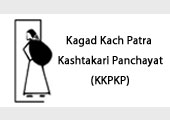India is our oldest country office. The Unforgotten began operations in Pune, India in 2009.
Wastepickers in Pune, India

There are an estimated 1,500,000 (15 lakh) wastepickers in India, or about 1% of the population. Maharashtra state has more than 300,000 (3 lakh) wastepickers, with nearly 9,000 of them living in the city of Pune. The proportion of women in the sector is 73%. Wastepickers in Pune are almost exclusively Dalits, of the ‘untouchable’ castes, more specifically the Mahar and the Matang castes. They rank the lowest within the urban occupational hierarchy even within the informal sector.
75% of the wastepicker mothers walk for more than five hours. Many walk up to 10 km (6 miles) a day with loads of up to 40 kgs (80 lbs). 50% of these women work 9-12 hours daily. The average daily earning is 150 Rs ($2 to $3 US). These wastepickers live in urban slums. Slums are overcrowded, dense areas and consist primarily of displaced people who were escaping famines in rural areas, in search of ways to earn a living. The living conditions of slums are quite unhygienic due to lack of proper housing and other basic services.
Projects
The Unforgotten field staff selected two wastepicker slums in Pune in which to work – Panmala Vasahat and Rajiv Gandhi Nagar on Sinhgad Road. Both slums are inhabited by wastepicker mothers and their daughters. These slum areas were selected with the assistance of Kagad Kach Patra Kashtakari Panchayat (KKPKP), the wastepicker union in Pune. We currently support 92 girls and 30 mothers. These girls have been in the program for several years, and have stopped wastepicking altogether.
Our program is largely supported by a grant from Dining for Women. Grant funds are being directed towards providing skills training and microloans to the mothers to start small businesses. Funds are also being used to enroll the daughters in primary school and providing them with extra tutoring. The goal is to free these families of the burden of earning a living by wastepicking. We also provide meals to our children who are enrolled in boarding school.
For detailed information about The Unforgotten projects in India, please visit the Projects section of this website.
Project Staff
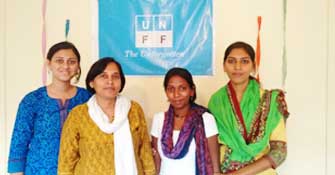
From L to R – Sweety (teacher), Ratna Yashwante (Project Manager), Priya & Shilpa (Field Coordinators)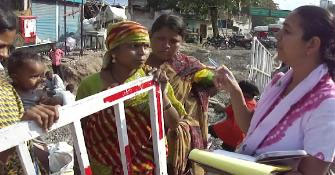
The Unforgotten team in Pune is led by Project Manager, Ratna Yashwante. The Unforgotten has also hired two young women from the slums to be our field coordinators: Priya Alhat and Shilpa Zombade, whose mothers are wastepickers. Priya and Shilpa receive support from The Unforgotten for their education. Priya is 18 years old, has successfully completed her 12th grade examination and is the field coordinator for Panmala Vasahat. Shilpa is 19 years old, has passed her 10th grade examination and is the field coordinator for Rajiv Gandhi Nagar. We also have a teacher, Sweety, and volunteers Rahul (PhD student) and Hrushikesh (Engineer).
As field coordinators, Priya and Shilpa identify families that survive by wastepicking, mobilize women for Self Help Group meetings, and provide support of school fees or tuition fees to families for girls and collect receipts.
As Project Manager, Ratna guides, trains and provides support to field workers in all their tasks. She conducts community meetings with the sponsored women, leads the formation of Self Help Groups (SHG), opens and maintains bank accounts of the SHG, monitors and implements project goals and objectives, tracks the funds and maintains the accounts, prepares reports, and coordinates with outside partners.
Partnerships and Stakeholders
Our work in India would not be possible without the support of Dining for Women (DFW), KKPKP, Planète Urgence and individual donors such as those from the Combined Federal Campaign.
We work closely with KKPKP union of waste pickers in the city. They help us in identifying beneficiaries, doing small research projects, photo documentation or implementing any activities. When required we partner with other Government or Non-Government agencies including schools and educational institutions.
In 2014, in collaboration with Planète Urgence, The Unforgotten hosted two volunteers from France to train the staff and program participants in photography, video documenting and efficient use of video cameras. With their support, The Unforgotten was able to develop a video documentary of The Unforgotten’s work in India / Pune.
The Unforgotten had the opportunity to host one social work intern from Spain for three months. With his help the project was able to develop SHG women interview documentation as well as conduct some group building activities with our girls.
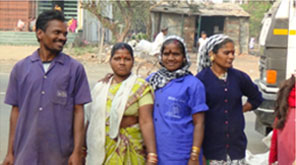
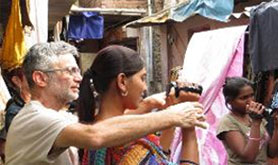
Personal Stories
Kudale girls
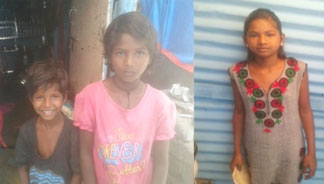
Preeti Ratan Gaikwad
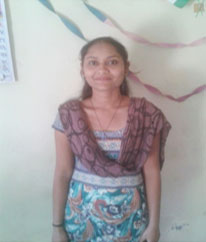
Maina
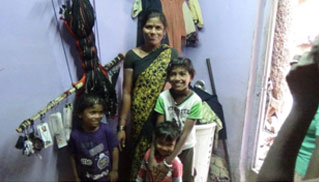 This is Maina, age 30, with her kids. She stays in Panmala Vasahat with her husband, two daughters and one son. She and her husband have worked as wastepickers for 5 years. They have been assigned a particular society area for door to door garbage collection. As it was difficult to manage expenses with their earnings, she started selling some goods and accessories on a wooden stand. She used to earn Rs. 100/- per day with that. She became a member of our Self Help Group and received a microloan of Rs. 5000/-. It helped her to purchase the accessories in large quantity as well as to get some fancy items. Maina is now able to sell more and earn about Rs. 200-250/- per day.
This is Maina, age 30, with her kids. She stays in Panmala Vasahat with her husband, two daughters and one son. She and her husband have worked as wastepickers for 5 years. They have been assigned a particular society area for door to door garbage collection. As it was difficult to manage expenses with their earnings, she started selling some goods and accessories on a wooden stand. She used to earn Rs. 100/- per day with that. She became a member of our Self Help Group and received a microloan of Rs. 5000/-. It helped her to purchase the accessories in large quantity as well as to get some fancy items. Maina is now able to sell more and earn about Rs. 200-250/- per day.
Sangita
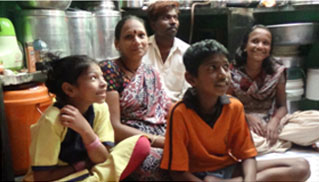 Sangita, age 34, stays in Panmala Vasahat with her husband, one son and one daughter. She works as a wastepicker and her husband runs a small workshop of iron cutting. Sangita became a member of our Self Help Group and received a microloan of Rs. 5000/-. She wanted to support her husband in the business. Using the loan they were able to buy the iron cutting machine that they were previously renting. Sangita’s family is now able to save the rent money and take on more work and earn more money. They now earn Rs. 500/- extra per day.
Sangita, age 34, stays in Panmala Vasahat with her husband, one son and one daughter. She works as a wastepicker and her husband runs a small workshop of iron cutting. Sangita became a member of our Self Help Group and received a microloan of Rs. 5000/-. She wanted to support her husband in the business. Using the loan they were able to buy the iron cutting machine that they were previously renting. Sangita’s family is now able to save the rent money and take on more work and earn more money. They now earn Rs. 500/- extra per day.
Mohini & her aunt Anita
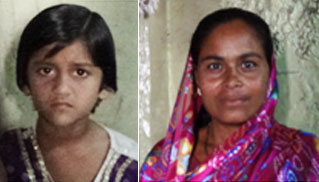 Eight year old Mohini resides in Panmala Vasahat with her paternal aunt Anita. Anita, who is a widow, is struggling to survive for herself and her son who is now big enough to work. She also looks after Mohini who lost her parents at a very young age. Anita is a wastepicker and a member of our Self Help Group. She received a microloan of Rs. 5000/-. Using this loan, Anita started making and selling brooms to earn Rs. 100/- per day. The Unforgotten supports Mohini for her school fees. She has successfully passed through second grade and is now studying in third grade.
Eight year old Mohini resides in Panmala Vasahat with her paternal aunt Anita. Anita, who is a widow, is struggling to survive for herself and her son who is now big enough to work. She also looks after Mohini who lost her parents at a very young age. Anita is a wastepicker and a member of our Self Help Group. She received a microloan of Rs. 5000/-. Using this loan, Anita started making and selling brooms to earn Rs. 100/- per day. The Unforgotten supports Mohini for her school fees. She has successfully passed through second grade and is now studying in third grade.
Anita Kamble
Anita says, “Microloans help us to get some extra earning in spite of the fact that I am not educated. And the most helpful thing is educational support for the girl that releases our burden to some extent.”
Usha Bagade
Usha says, “Because of the support received we try to do something that could help us earn more money which is always necessary. And because we will again get the support we are motivated to repay the loans.”
Expenses in 2014
| Expense | Indian Rupees | US $ |
|---|---|---|
| Total | 730,696.00 | 12,179.00 |
| School fees | 85,050.00 | 1,418.00 |
| Tutoring | 177,000.00 | 2,950.00 |
| Microloans | 151,000.00 | 2,517.00 |
| Business supplies | 5,296.00 | 88.00 |
| Travel | 14,400.00 | 240.00 |
| Facilities | 9,700.00 | 162.00 |
| Information Technology | 36,250.00 | 604.00 |
| Staff (project manager and two field workers) | 252,000.00 | 4,200.00 |
Measuring Program Success – Targets for Mothers
| Program Objective | Description of objective | Measuring success | Objective met? |
|---|---|---|---|
| Income generation | Increase each mother’s income to $2 per day. | We have a target of 50% of women meeting this goal in two years. And our goal is to have 90% of our sponsored women meeting that income target in 5 years. | Yes. 20 out of 30 women i.e. 66% that we supported through microloan have increased income to $3 per day. |
| Loan repayment | Initially, each woman will be given a small loan of Rs. 5000/- ($100 US). Those that are successful in repaying the smaller loan, will be given larger loans (up to Rs. 25000/- or $500 US). | Our goal is to have 75% of the mothers paying back the small loan within the first six months. Our goal is to have 75% of the larger loans repaid in two years (by the end of the DFW grant period). | Initially, 30 women received a small loan of Rs. 5000/- ($100 US), and given ten months to repay that loan. 18 out of 30 women i.e. 60% of the mothers repaid back the small loan within the first ten months. |
Measuring Program Success – Targets for Girls
| Program Objective | Description of objective | Measuring success | Objective met? |
|---|---|---|---|
| Grade advancement | Sponsored girls should be receiving good report cards, passing their school exams and progressing to higher grade levels. | We have a target of 90% of all our sponsored girls advancing to the next grade, every year they are in the program. | 14 out of 19 sponsored girls i.e. 73% of them advanced to the next grade, every year they are in the program. |
| End to wastepicking | Field teams will visit the sponsored families at their homes and visit the waste dump sites to ensure that girls are attending school and not working at the trash dumps. | We have a target of 90% of all our sponsored girls ceasing to be wastepickers, and fully concentrating on being students. | Yes, in fact 100% of our sponsored girls have ceased wastepicking. |
| Regular attendance | We will check with the girls’ teachers to monitor their attendance. | We have a target of each child missing no more than 15 days per school year. | Yes, our sponsored girls have been regularly attending. school |
For more information about our India Chapter, please contact our Country Director for India – Ms. Vandana Naik ( : vandana.naik @unforgotten.org )

